Lorillard Tobacco Co. v. Reilly
United States Supreme Court
533 U.S. 525, 121 S. Ct. 2404, 150 L. Ed. 2D 532 (2001)
- Written by Megan Petersen, JD
Facts
A Massachusetts regulation of tobacco advertising prohibited the advertising of tobacco products within 1,000 feet of a school or playground and required that places selling tobacco products place ads for these items at least five feet off the ground to avoid being at eye level for children. Lorillard Tobacco Co. (plaintiff) filed suit in federal district court against Reilly (defendant), the Massachusetts attorney general, on the grounds that (1) cigarette-advertising regulations were preempted by the Federal Cigarette Labeling and Advertising Act (FCLAA), which prescribed mandatory health warnings for cigarette packaging and advertising, and (2) the ban on advertising for cigarettes, smokeless tobacco, and cigars violated the First Amendment. The district court held that the state’s restrictions on the location of advertising were not preempted by the FCLAA and that the outdoor-advertising restrictions did not violate the First Amendment, but the court concluded that the point-of-sale-advertising restrictions were invalid. The court of appeals affirmed the preemption holding and the First Amendment holding regarding the outdoor-advertising restrictions, but it reversed the First Amendment holding regarding the point-of-sale restrictions. The United States Supreme Court granted certiorari.
Rule of Law
Issue
Holding and Reasoning (O’Connor, J.)
Concurrence (Kennedy, J.)
Concurrence (Thomas, J.)
Concurrence/Dissent (Stevens, J.)
What to do next…
Here's why 904,000 law students have relied on our case briefs:
- Written by law professors and practitioners, not other law students. 47,100 briefs, keyed to 995 casebooks. Top-notch customer support.
- The right amount of information, includes the facts, issues, rule of law, holding and reasoning, and any concurrences and dissents.
- Access in your classes, works on your mobile and tablet. Massive library of related video lessons and high quality multiple-choice questions.
- Easy to use, uniform format for every case brief. Written in plain English, not in legalese. Our briefs summarize and simplify; they don’t just repeat the court’s language.





